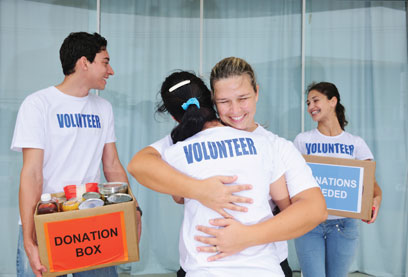 When she arrived in the Eastern Washington farming community of Wapato last spring for a six-day school service trip, Overlake High School junior Caroline Spencer expected to learn about migrant farm workers’ issues and work alongside them in apple orchards. What she didn’t expect was that her experiences with the community’s children, and seeing the challenges they face trying to succeed in school, would touch her so deeply. She would return to live in a Latino farming community the following summer for six weeks, tutoring young children to read in Spanish and English. “Volunteering opened up a whole new world for me,” she says, “one that I plan on exploring in college and beyond.”
When she arrived in the Eastern Washington farming community of Wapato last spring for a six-day school service trip, Overlake High School junior Caroline Spencer expected to learn about migrant farm workers’ issues and work alongside them in apple orchards. What she didn’t expect was that her experiences with the community’s children, and seeing the challenges they face trying to succeed in school, would touch her so deeply. She would return to live in a Latino farming community the following summer for six weeks, tutoring young children to read in Spanish and English. “Volunteering opened up a whole new world for me,” she says, “one that I plan on exploring in college and beyond.”
Many public and private high schools in the greater Seattle area are asking teens to take part in community service as a graduation requirement. Some schools see volunteering as a way to show students that they can positively impact their community, or to build students’ empathy and increase their awareness of the needs of others. Some counselors encourage volunteering as a way to gain valuable work experience. Parents and students may even hope it will strengthen a college application. Whatever the impetus, teens who embrace the experience find they get a lot more out of it than just fulfilling credits toward graduation.
Finding opportunities
There are probably as many ways to volunteer as there are student interests. School counselors can help their students find volunteer opportunities, often using the Web to point teens in the right direction. Seattle’s Garfield High School website lists volunteer opportunities alongside its scholarship and internship opportunities.
Garfield’s head counselor, Ken Courtney, advises students to pick an area of personal interest, such as the outdoors, for which they might enjoy volunteering, or to choose a possible future career interest, such as medicine or working with children. Serving in that area is a way to explore it and gain experience and skills that might help secure a job in the future, he says.
Websites such as those of United Way of King County, Mercer Island’s Volunteer Outreach in Communities Everywhere (VOICE) and Teens in Public Service (teensinpublicservice.org) also list opportunities. And, of course, families can directly contact any organization they are interested in serving.
Austen Dowell, a junior at Ingraham High School in Seattle, started volunteering with the TOPsoccer program, which serves disabled children ages 6–17, to fulfill the 160 volunteer hours he needs to graduate from his school’s international baccalaureate program. On most Sundays for the past year, he has been running drills and scrimmages for children with autism, in wheelchairs or with other disabilities. At first he felt trepidation: How should he interact with these kids? Would he feel awkward? How could he help?
“I learned that speaking calmly and not jumping around yelling like a typical coach worked best,” he says. Dowell adds that he loves to see what his players can achieve and hopes to keep coaching in the future. “They really light up when they learn something new,” he says. While it started as an obligation, Dowell says, coaching is now the best part of his Sundays.
Opening windows to the future
Volunteering is especially beneficial to low-income teens. According to a 2007 federal study, disadvantaged teens who volunteer feel empowered, and are more likely to become politically engaged and to believe they will graduate from college and make a difference in their communities.
Volunteering can also expand a teenager’s perspective. “I learned that you don’t have to go to another country to find people in need,” Spencer says. She hopes her time in the farming community, coupled with her education, will allow her to engage in immigration and human rights issues more deeply in the future. She aspires to influence policy on behalf of people who might not have a strong voice in the debate.
Students who put more effort into volunteering may also benefit when it comes to college. Most students who apply to college these days list volunteer experience on their application, according to Paul Seegert, associate director in the admissions office at the University of Washington. The students who stand out, he says, are ones who have taken on leadership roles, shown a long-term commitment to service, or brought innovation or creative solutions to their work. Beyond showing up, students who have “helped make the service more effective” get more notice, Seegert says. While academics still trump activities in the college admissions process, he says, volunteering is taken into consideration.
Whether it is a one-time trail-maintenance outing in the rain, a weekly tutoring commitment or an organizational role in rallying classmates to pitch in, volunteering can help teens gain a sense of responsibility, feel more connected to their communities and prepare for the future. And the unexpected rewards of discovering a new interest, or feeling as though they’ve made a difference, can last a lifetime.
Julie Weed is a Seattle-based freelance writer for The New York Times and others.










